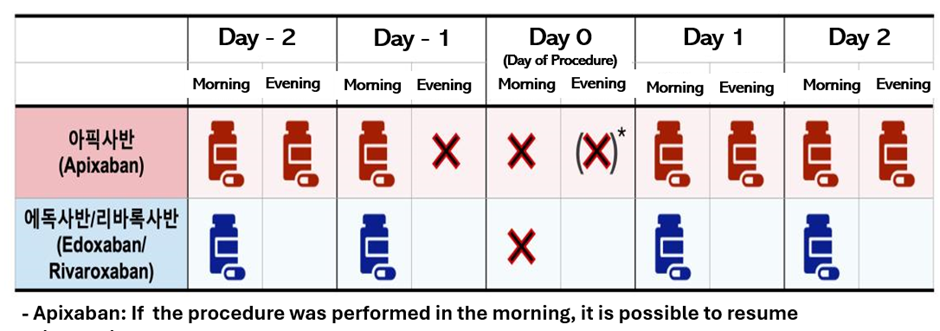SNUH demonstrated the Safety of Standardized Anticoagulant Discontinuation and Resumption Protocol for Low-Bleeding Risk Procedures in Atrial Fibrillation Patients
- Establish a Safe Anticoagulant Discontinuation and Resumption Protocol Before and After Low-Bleeding Risk Procedures from Multicenter Prospective Cohort Study
- Bleeding Rate of 0.1% within 30 Days, No Thromboembolic Events... Presenting an Effective Anticoagulation Management Plan
A recent multicenter prospective cohort study led by the research team at Seoul National University Hospital(SNUH) demonstrated that a standardized protocol (PERIXa) for direct discontinuation and resumption of oral anticoagulants in patients with atrial fibrillation undergoing procedures with a low risk of bleeding was safe and effective, with a bleeding rate of 0.1% and no thromboembolic events. This study evaluated the safety of directly discontinuing and retaking oral anticoagulants in patients with atrial fibrillation undergoing procedures with a low risk of bleeding, such as endoscopy, dental procedures, and ophthalmic surgeries, and is expected to be an important step towards improving anticoagulant management guidelines in the future.
Atrial fibrillation is the most common arrhythmia, a disease in which the heartbeat becomes irregular and blood clots are formed in the heart, increasing the risk of stroke and thromboembolism. To prevent this, patients with atrial fibrillation are prescribed oral anticoagulants, but anticoagulants should be temporarily discontinued when undergoing surgery or non-surgical procedures due to the risk of bleeding. However, existing guidelines for discontinuing anticoagulants are complex, and there has been a lack of specific research on procedures with low bleeding risk.
Professors Choi Eue-Keun and Lee So-Ryoung along with Lee Kyung-Yeon (Clinical Instructor) from the Department of Cardiology at SNUH announced the results of a multicenter prospective cohort study on February 26th. This study was conducted at 29 hospitals, including SNUH, Samsung Seoul Hospital, and Seoul Asan Medical Center, from September 2020 to April 2024. The research analyzed the incidence of bleeding and thromboembolism in 1,902 patients with atrial fibrillation who discontinued anticoagulant protocol before and after low-bleeding-risk procedures.
The research team established a standardized protocol called ‘PERIXa’ to simplify the existing complicated guidelines and make them easier for patients and medical staff to follow.
The ‘PERIXa’ protocol is based on the existing EHRA (European Heart Rhythm Association) guidelines, in which anticoagulants are taken for the last time 24 hours before the procedure and then resumed on the day after the procedure. The existing guidelines had different recommendations in various clinical fields regarding when to discontinue the drug. The PERIXa protocol simplifies this, and for once-daily drugs, the morning dose on the day of the procedure is skipped and the dose is resumed from the morning after the procedure. For taking twice-daily drugs, the dose is stopped the evening before and the morning of the procedure, and the bleeding status is checked before resuming the dose on the evening of the procedure day or the following morning.
The study was conducted by dividing the groups according to type of procedure (endoscopy, dental procedure, ocular surgery) and type of anticoagulant (Apixaban, Edoxaban, and Rivaroxaban); the main outcomes were event rates of major bleeding and thromboembolism within 30 days.
The results showed that the 30-day event rate of major bleeding was 0.1% (n = 2), and there were no composite thromboembolic events. The bleeding rate was consistently low regardless of the type of procedure, and although the bleeding rate was somewhat higher in dental procedures, it was still safe. The bleeding rate was similarly low for all factor Xa inhibitors, including Apixaban, Edoxaban, and Rivaroxaban.

[Figure] Method of stopping and restarting anticoagulants according to the ‘PERIXa’ protocol: Anticoagulants taken once a day (Edoxaban/Rivaroxaban) are skipped on the morning of the procedure and resumed the morning after the procedure. Anticoagulants taken twice a day (Apixaban) are stopped on the evening before the procedure and the morning of the procedure and resumed after checking the bleeding status.
This study demonstrated that the PERIXa protocol for discontinuing and retaking anticoagulants in patients with atrial fibrillation undergoing low-bleeding-risk procedures was effective at preventing stroke without increasing the risk of bleeding and thromboembolism. The research team emphasized that a standardized protocol could provide patients with a safer and more efficient method of anticoagulation management.
Professor Choi Eue-Keun (Dept of Cardiology) said, “The results of this study will play an important role in improving future anticoagulant management guidelines.” He added, “We will be able to provide safer and more effective treatment by minimizing unnecessary anticoagulant discontinuation for atrial fibrillation patients undergoing low-bleeding risk procedures through a standardized anticoagulant discontinuation and resumption protocol.”
The results of this study were published in the journal ‘JAMA Network Open’, an academic journal of the American Medical Association.

[Pictures from left] Professor Choi Eue-Keun, Professor Lee So-Ryoung and Clinical Instructor Lee Kyung-Yeon from SNUH Department of Cardiology